The “2019 Social Rule of Law Research High-end Forum and Social Security Legal System Research in the Third Jurisdiction Perspective Forum” held successfully
Date:2019-11-20
On October 12, 2019, sponsored by Social Law Studies Institute of China Law Society and organized by Peking University Law School, Institute of Labor Law and Social Security Law of PKULS, and Research Center for Non-Profit Organization Law of PKULS, the "2019 Social Rule of Law Research High-end Forum and Social Security Legal System Research in the Third Jurisdiction Perspective Forum" was successfully held at Koguan Building, PKULS. The forum attracted more than 30 experts and scholars from various universities and research societies to participate. Focusing on the theme of “the social security legal system in the third jurisdiction”, the participants discussed four sub-topics: the social security system in the view of state and society relations, social insurance and social assistance, charity and social security system in the social governance pattern of co-construction, co-governance and sharing, and the system of China's social security law and its perfection.

Opening Ceremony
The opening ceremony was hosted by Prof. Jin Jinping of PKULS. First of all, Prof. Jin Jinping welcomed the guests who came to the meeting, and then introduced the guests.
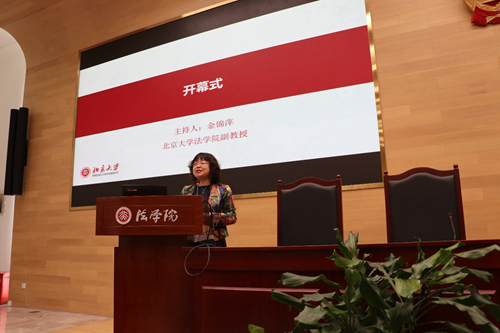
Prof. Jin Jinping hosted the opening ceremony
Prof. Guo Li, Party Secretary of PKULS, delivered a speech first. Prof. Guo Li said that the research on the rule of law in society is another form of gift for our motherland. By recalling four important points in the history of PKULS, Prof. Guo Li pointed out the importance of social law discipline construction and put forward three criteria to test its activity. Finally, Prof. Guo Li wished the forum a success.

Prof. Guo Li delivered a speech
Subsequently, Prof. Ye Jingyi of PKULS, Vice President and Secretary-General of Social Law Studies Institute of China Law Society, delivered a speech. Prof.Ye Jingyi pointed out that the development of the rule of law is one of the great achievements of the nation, search matrix for the rule of law is an important measure for the China Law Society to further explore the construction of a new type of think tank for the rule of law with Chinese characteristics since 2015, and is also an important platform for close cooperation among research institutes, law schools and departments. Prof.Ye Jingyi reviewed all previous high-end forums on the rule of law and wished the forum a success.

Prof. Ye Jingyi delivered a speech
Sub-topic I: Social Security System in the Perspective of National and Social Relations
Forum on sub-topic I was hosted by Xie Zengyi, Vice-President of Social Law Studies Institute of China Law Society and Researcher of Institute of Law of CASS. President Xie Zengyi thanked the Forum organizers, host, and speakers, and introduced the speakers and commentators on the topic.

Xie Zengyi hosted forum on sub-topic I
First, Prof. Jin Jinping of PKULS reported on the theme of "the impact of the rise of the third jurisdiction on the social security legal system". Prof. Jin Jinping sorted out the concept of the third jurisdiction, the concept of social law and the basic principles of social security, and summarized the main social security model in the world, on the basis of which discussed the impact of the rise of social law on social security.

Prof. Jin Jinping delivered a speech
Prof. Tian Silu of Economic Law College of East China University of Political Science and Law,Vice President of Social Law Studies Institute of China Law Society, made a report on the theme of “Japanese Social Law of Right to Subsistence and Modern Social Security Law”. Prof. Tian Silu summarized many theories and evaluations of Japanese social law, and got enlightenment by combing the development of Japanese social law theory. He said that the development of social law is inseparable from practice and practice is the source of social law theory.
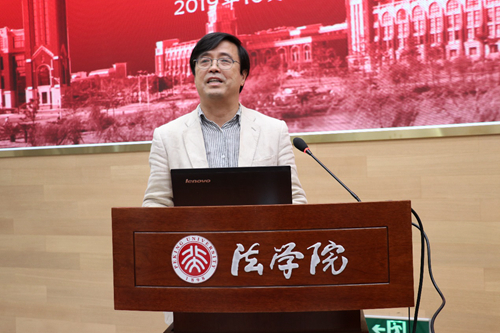
Prof. Tian Silu delivered a speech
A.P. Jin Yuqian of Hunan University Law School reported on the theme of 'Self-responsibility' and 'Social Security' - 'Net' of German Basic Social Security . A.P. Jin Yuqian explained the theme of her report and the four levels of "net" of basic social security in Germany from two major adjustments of the social security system.
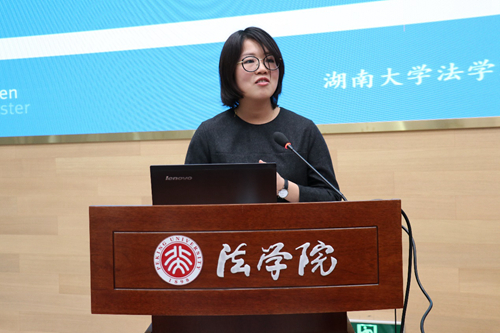
A.P. Jin Yuqian delivered a speech
Prof. Hu Chuanning, Economic Law School of Southwest University of Political Science and Law, reported on the theme of "Historical Evolution and Reflection of German Legal Disease Insurance Subjects". Prof. Hu Chuanning summarized the four stages of development of the main body of disease insurance in Germany, considered that the choice of social insurance organizational model was a kind of value judgement in essence, and finally put forward the prospect of the reform of legal person of medical insurance agency.
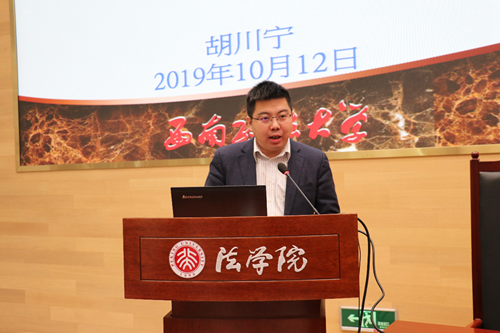
Prof. Hu Chuanning delivered a speech
During the discussion, Prof. Chang Kai of Labor and Personnel College of Renmin University of China, Vice President of Social Law Studies Institute of China Law Society, thought that the speeches of the four scholars had their own characteristics and provided many new research methods for future research.
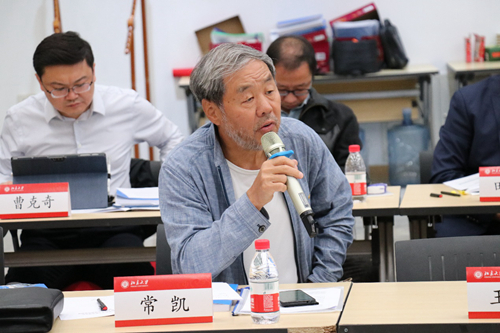
Prof. Chang Kai delivered a speech
Prof. Xie Qiong, China Research Institute of Social Management of Beijing Normal University, presented her views on basic principles of social security and responsibility sharing.
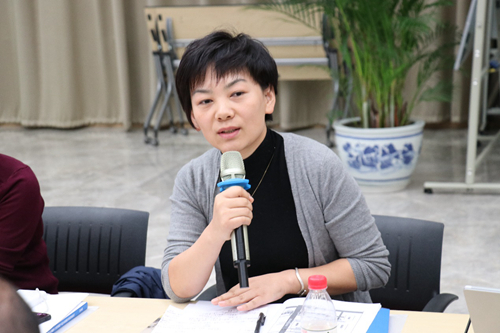
Prof. Xie Qiong delivered a speech
Sub-topic II: Social Insurance and Social Assistance
Forum on sub-topic II was hosted by Prof. Zheng Shangyuan of Tsinghua University School of Law, Vice President of Social Law Studies Institute of China Law Society.
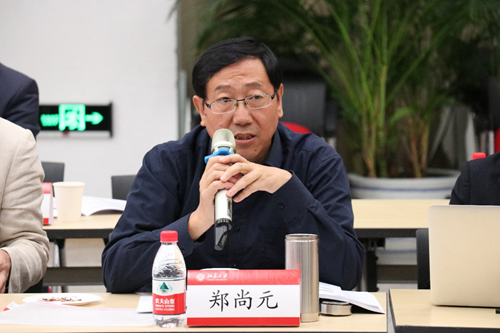
Zheng Shangyuan hosted forum on sub-topic II
First, Prof. Yang Sibin of School of Government of China University of Labor Relations, gave a report on the theme of "Social Assistance Legislation: International Comparative Perspective and Indigenous Thinking". Prof. Yang Sibin reported from four aspects: the historical context of social assistance legislation in major western countries, the basic characteristics of social assistance laws in major western countries, the basic rules of social assistance legislation in foreign countries, and the enlightenment to our country.
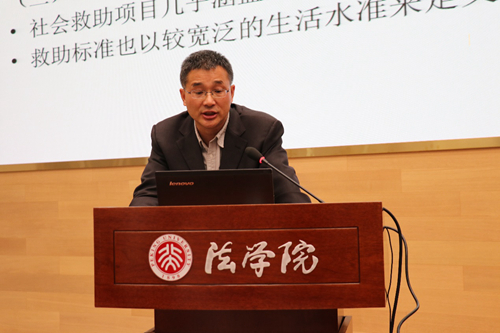
Prof. Yang Sibin delivered a speech
Wang Tianyu, Associate Researcher of Institute of Law of CASS, reported on the theme of "Structural Reflection and Reform of Social Insurance Dispute Settlement System". Wang Tianyu pointed out that as the social insurance dispute settlement system at this stage is of a dual structure, the settlement of social insurance disputes is not the obligation of the Labor Law but the public law obligation to a certain extent. Therefore, social insurance disputes shall be included in the administrative disputes. Wang Tianyu further pointed out that he hoped to build an independent social law system in the future.
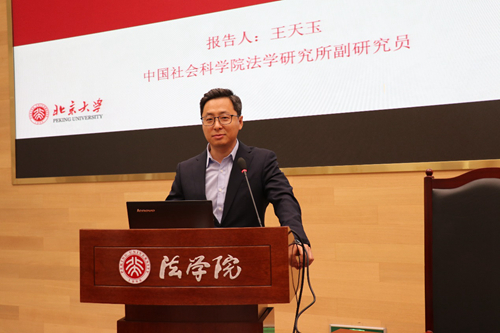
Wang Tianyu delivered a speech
Dr. Tian Mengmeng, Ph. D. student of Wuhan University Law School, gave a report on the topic of "On Mathematical Logic of China's Social Insurance: Actuary and Budget". According to Tian, actuary and budget are the important contents of social insurance financial system, and social insurance must comply with such basic principles as actuary principles. Through investigating the social insurance practice from the aspects of income and expenditure, Tian Mengmeng thought that social insurance subsidy should be based on actuarial results.
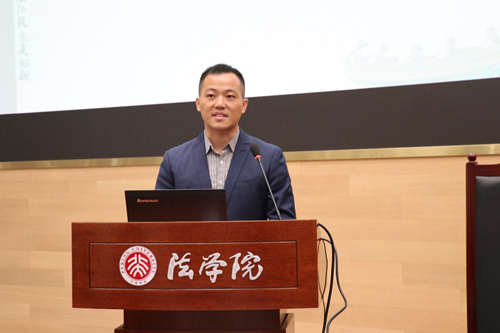
Tian Mengmeng delivered a speech
In the comments on the sub-topics, Prof. Zhang Rongfang of Wuhan University Law School , Vice President of Social Law Studies Institute of China Law Society, held that the crux of the dualization of the social insurance dispute settlement mechanism lies in the failure to distinguish labor relations from social labor relations. It is very meaningful to rethink the problems of social insurance dispute settlement mechanism.

Prof. Zhang Rongfang gave comments
Prof. Tian Silu put that Yang Sibin provided us with a reference to the Western system, and his research was of great value. In addition, Prof. Tian thought that the reason of the confusion lied in the unsolved legal principle of social security law, and that the discussion of social security system would return to the level of law.
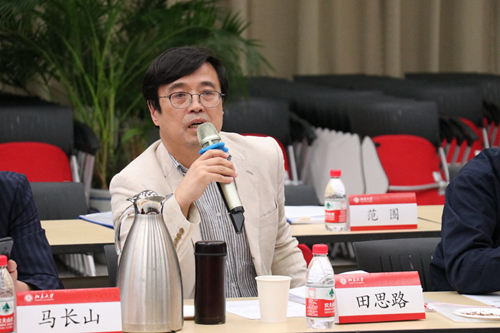
Prof. Tian Silu gave comments
Researcher Ran Hao of Institute of Law of the CASS pointed out that, for the confusion in the field of social law, on the one hand, the relationship between various legal concepts need to be sort out, on the other hand, there are limitations in the process of learning from foreign experience.
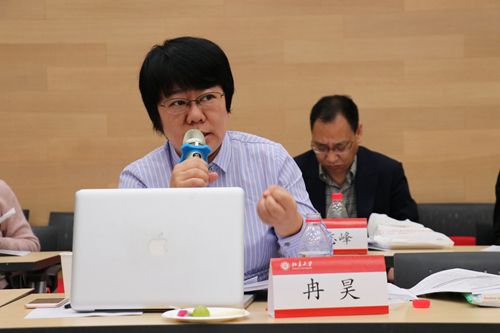
Ran Hao gave comments
Prof. Ye Shan of PKULS believed that it was instructive to explore the relationship between social security law and labor law with different research methods and perspectives. Social relief legislation lacks sufficient theoretical support, and as a scholar there is still a lot to do. In addition, Prof. Ye Shan also raised two doubts about the third topic report. One is whether the research methods in this paper are applicable to several types of social insurance system; the other is how to define the two concepts of budget and actuarial accounting.
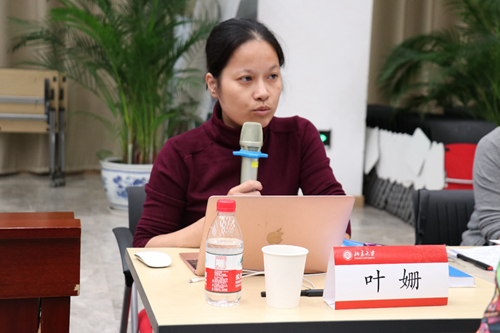
Prof. Ye Shan gave comments
Sub-topic Ⅲ: charity and social security system in the social governance pattern of co-construction, co-governance and sharing.
Prof. Ma Changshan of East China University of Political Science and Law chaired the forum on sub-topic of "charity and social security system in the social governance pattern of co-construction, co-governance and sharing".
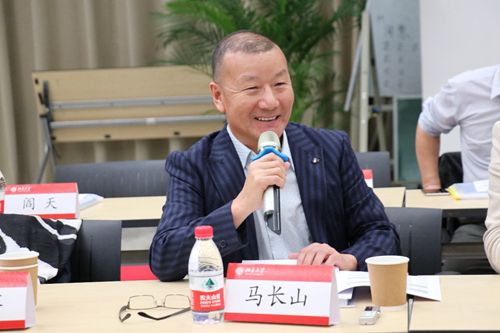
Prof. Ma Changshan hosted the forum on sub-topic Ⅲ
First of all, Prof. Lou Yu, Institute of Social Law, School of Economic Law, China University of Political Science and Law, gave a report on the theme of "the construction of social insurance legal system for shared economic workers". Prof. Lou first introduced the policy background of the theme of the report, and then analyzed the "binding" and "loosening" of the social insurance and labor relations, the respective functions of several types of social insurance, and the final design of legal system.
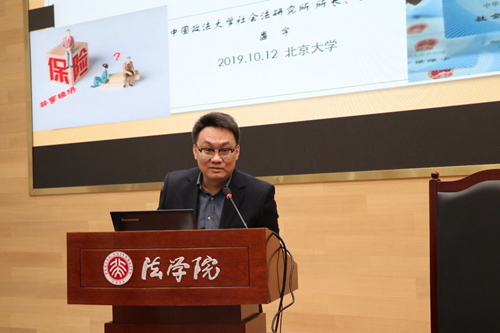
Prof. Lou Yu delivered a speech
Then, Prof. Ma Jianyin, Law School of Beijing Normal University, made a report on the theme of "the dilemma of implementing charity law: starting from the legal interpretation system of our country." Prof. Ma Jianyin pointed out several dilemmas in the implementation of the Charity Law: first, the relationship between the Charity Law and the Social Security Law has not been clarified; second, the regulatory authorities have different ideas on the management of charities and social organizations; third, the law is interpreted through administrative law enforcement, and there is no remedy approach after interpretation.
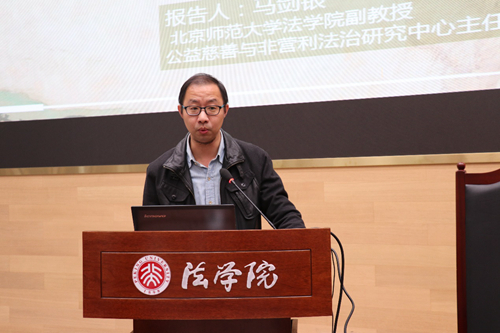
Prof. Ma Jianyin delivered a speech
Prof. Wang Liming, Law School of Qinghai University for Nationalities, made a report on the investigation of the precise poverty alleviation in Qinghai Province from the perspective of the rule of law in the new era. Prof. Wang Liming discussed the theoretical evolution of precise poverty alleviation and the employment of nomadic people on the level of theory and practice respectively.

Prof. Wang Liming delivered a speech
Prof. Lv Xin of Law School of Zhejiang University of Technology made a report on the theme of "the origin of charity law". Prof. Lv Xin introduced the core content and practical effect of the first charity law, and thought that the legislation of charity law is a process from emphasizing supervision to emphasizing power.
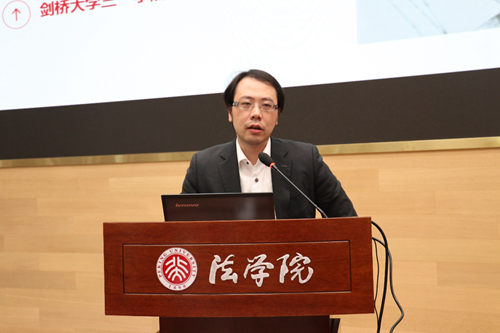
Prof. Lv Xin delivered a speech
Researcher Zhu Zhifeng of Jilin Academy of Social Sciences reported on the theme of "Dilemma and Outlet of Charity Law". Researcher Zhu Zhifeng believed that the formulation and implementation of the Charity Law in 2016 is a milestone, and discussed the plight of the legitimacy of citizens' charity, the legitimacy of government charity and the effectiveness of charity supervision.

Zhu Zhifeng delivered a speech
During the discussion, Prof. Wang Quanxing of Law School of Shanghai University of Finance and Economics, Vice Chairman of Social Law Studies Institute of China Law Society, thought that the three articles on charity law discussed the orientation of charity law, the relationship between implementation and empowerment, and the construction of implementation mechanism, which were big questions worthy studying.
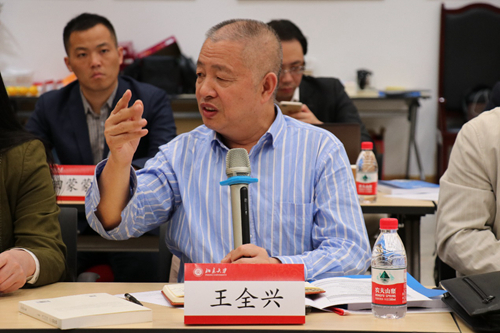
Prof. Wang Quanxing gave comments
Prof. Zhao Hongmei, School of Economic Law of Civil Business, China University of Political Science and Law, put forward her opinions on the five reports and pointed out the common issues involved in the reports, namely, the relationship between social security law and charity law.
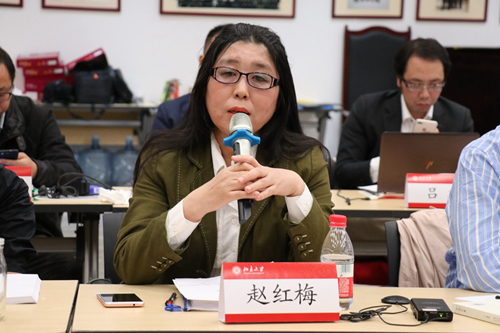
Prof. Zhao Hongmei gave comments
Prof. Shen Guoqin of Public Security University of China talked about her personal views on the relationship between charity law and social law. Prof. Shen Guoqin believes that charity law guarantees the realization of social rights and is a legal norm to correct the relations of substantive equality.

Prof. Shen Guoqin gave comments
Prof. Chen Yifeng of PKULS, talked about the specific historical background of British Charity Law and expressed his opinions on the orientation of Charity Law.
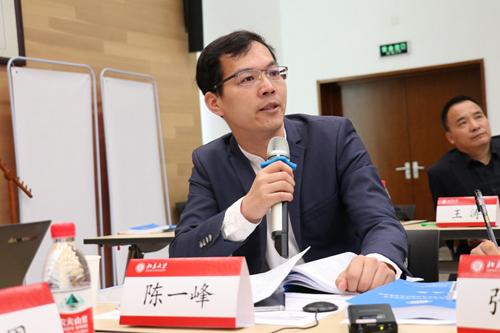
Prof. Chen Yifeng gave comments
Sub-topic Ⅵ: The System and Perfection of China's Social Security Law
Forum on sub-topic Ⅵ was divided into four parts, "China's Social Security Law System and its Improvement", presided over by Prof. Feng Yanjun of Law School of Jilin University, Social Law Studies Institute of China Law Society.
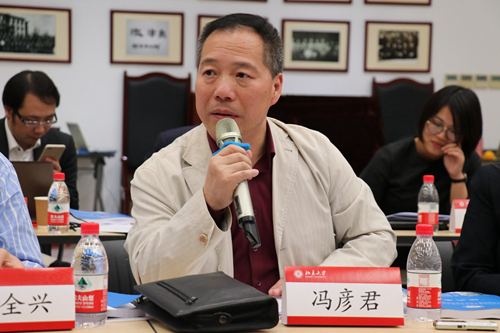
Prof. Feng Yanjun hosted forum on sub-topic Ⅵ
First, Cao Keqi, a lecturer of Shanxi University Law School, gave a report on the theme of "Review and Prospect of Seventy Years of Social Insurance Legal Construction". Social insurance law is a rare and valuable legal system with 70 years of complete development in the history of new China. Cao Keqi hoped to sum up the law in the course of development and provide theoretical basis and explanatory standpoint for future legislation.
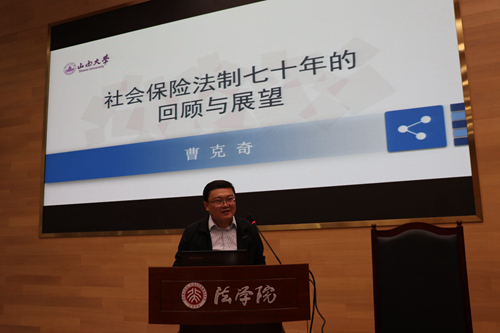
Cao Keqi delivered a speech
Li Qing, a lecturer of Humanities College of Guangxi Medical University, made a report on the theme of "Study on Financial Expenditure Responsibility and Fairness of Medical Security in Western Regions". Through theoretical analysis and empirical research, Li Qing came to some conclusions. The scale of the central government's medical assistance to the western region is increasing, and there are some problems, such as low efficiency of resource allocation and total output in the region, etc.
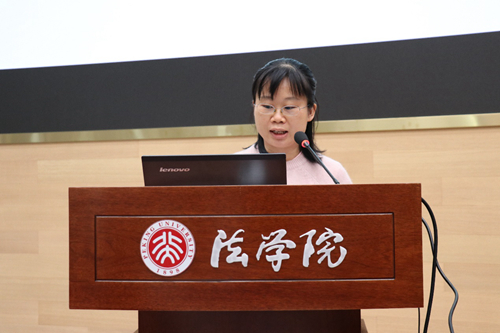
Li Qing delivered a speech
Prof. Wang Tao of Law School of Shandong Liaocheng University made a report on "Probe into and Analysis of the Legal Position of Social Enterprises". The report by Prof. Wang Tao consisted of four parts: first, understanding and source power of sociology; second, domestic and overseas analysis of social enterprises; third, understanding the main dimensions of social enterprises; and fourth, legislative expression of the legal nature of social enterprises.
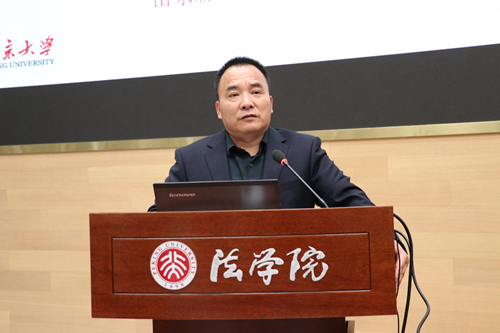
Prof. Wang Tao delivered a speech
Li Jing, a lecturer at the Law School of the Chinese Institute of Labor Relations, gave a report on the theme of "The Security System for Persons with Disabilities from the Perspective of Social Law". Li Jing talked about several changes, namely, the transformation of the Security System for Persons with Disabilities from Nothing to Nothing, the transformation of the concept of individuals to the concept of groups, the transformation of words from disability to handicap, the transformation from treatment to social integration, and the transformation from domestic to international.
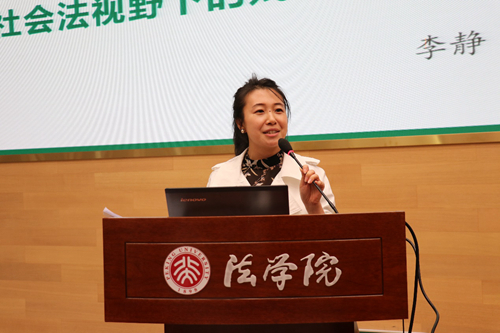
Li Jing delivered a speech
Prof. Fan Wei of School of Labour Economics at the Capital University of Economics and Trade gave a report on the theme of "Reflection on and Transformation of the Division of Legislation Rights for Social Security in China". Prof. Fan Wei discussed the problems, status quo, reflections and transformation of the division of legislative power in China's social security.
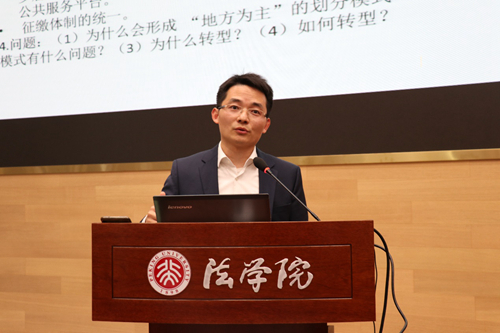
Prof. Fan Wei delivered a speech
During the deliberation phase, Prof. Wang Quanxing of the Law School of Shanghai University of Finance and Economics, vice chairman of Social Law Studies Institute of China Law Society, applaud the 70-year summary and review of the Social Insurance Law, and put forward his opinions on issues such as the financial responsibility for medical insurance in the Western Region and the legal status of social enterprises.
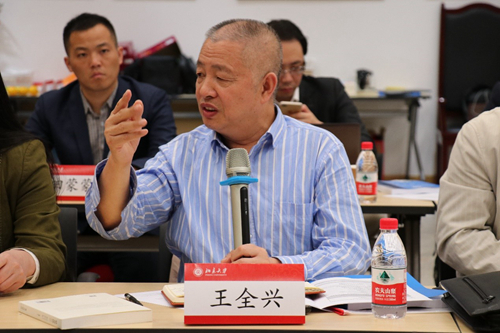
Prof. Wang Quanxing gave comments
Yu Shaoxiang, director of Institute of Social Development Strategy of CASS, introduced his work on basic theories of social law and hoped that all scholars would work together to pass a social insurance law.
Prof. Zhang Liyun, Law School of Chinese Institute of Labor Relations, argued that social insurance law and charity law are not purely rights and obligations, but interests. And the social security system should also consider the distribution of management rights. For other topics, Prof. Zhang Liyun also put forward opinions.
Prof. Ma Jinfang of Academy of Science, East China University of Political Science and Law, talked about her experience on the boundaries of social law, social legislation and national legislation.
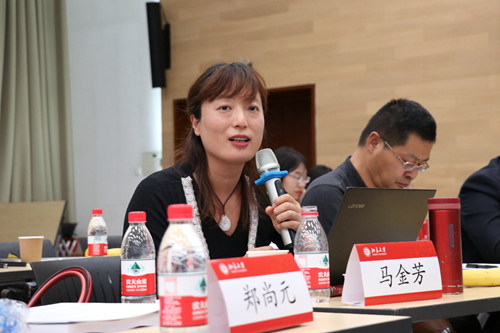
Prof. Ma Jinfang gave comments
Meeting Summary
Finally, A.P. Yan Tian of PKULS, summed up the meeting.
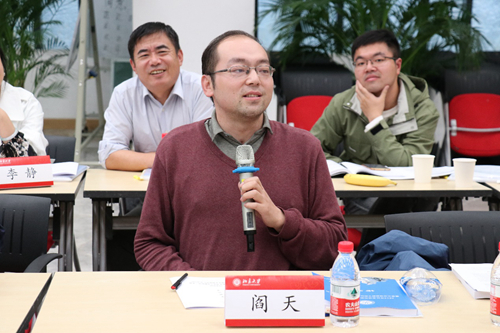
A.P. Yan Tian gave summary
Prof. Ye Jingyi made the final summary on the whole forum. Prof. Ye Jingyi pointed out that the attendees studied from the perspectives of history and reality, theory and practice, international experience and local construction, top-level design and concrete system design, which are both rich and theoretical. Finally, Prof. Ye Jingyi thanked all the guests, organizers and staff of the conference.

Prof. Ye Jingyi gave summary
At this point, "2019 Social Rule of Law Research High-end Forum and Social Security Legal System Research in the Third Jurisdiction Perspective Forum" came to a successful end.
(Note: the speeches of the above-mentioned guests only represent the personal point of view and do not represent the opinions of their employers.)
Translated by: Tian Lian
Edited by: Xu Luyu



